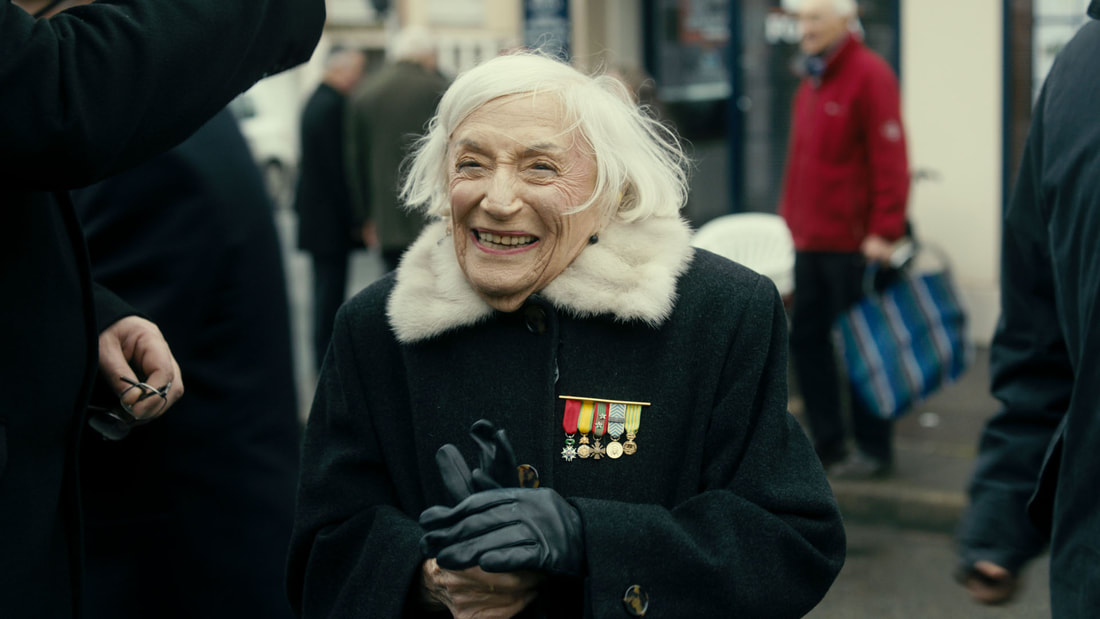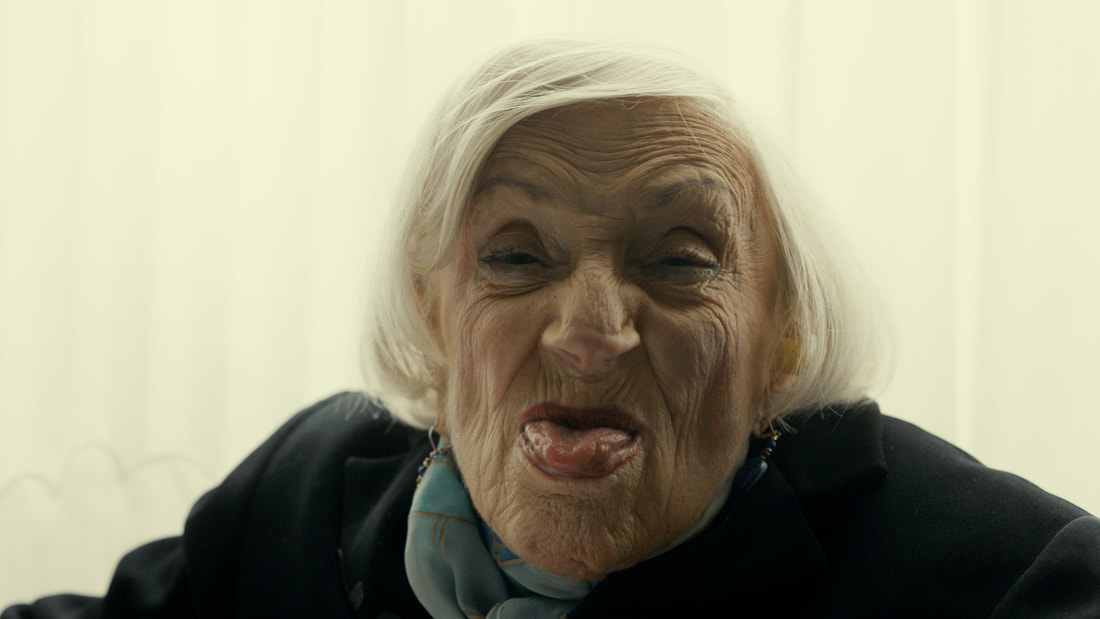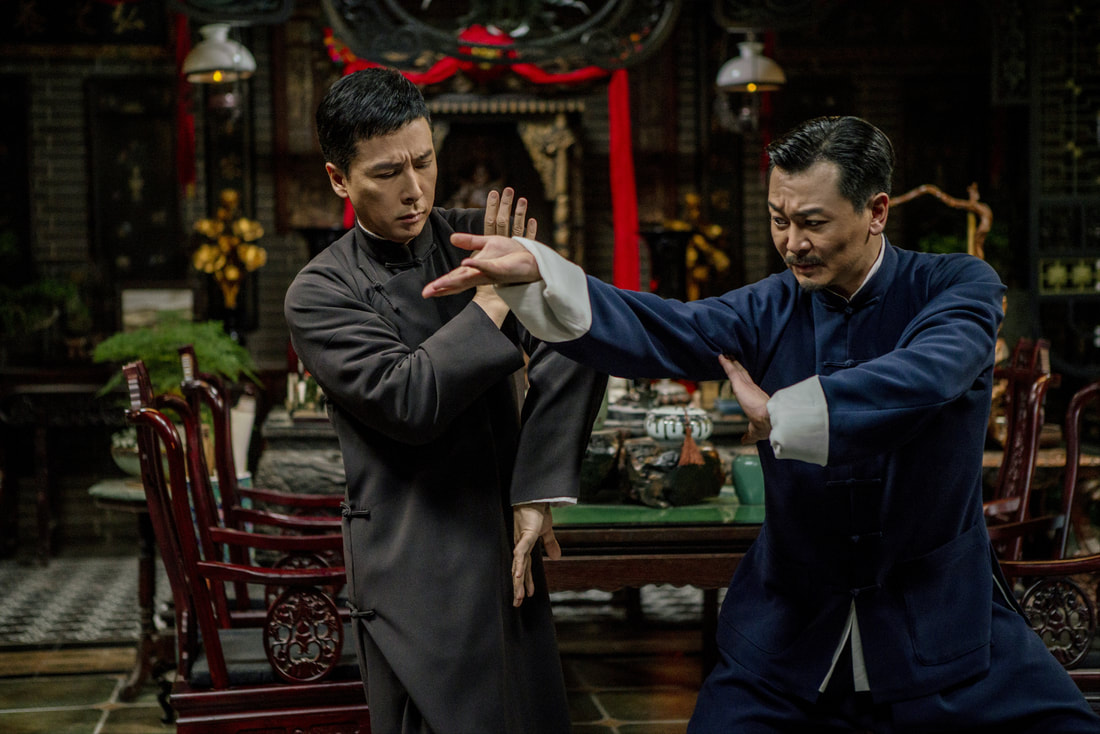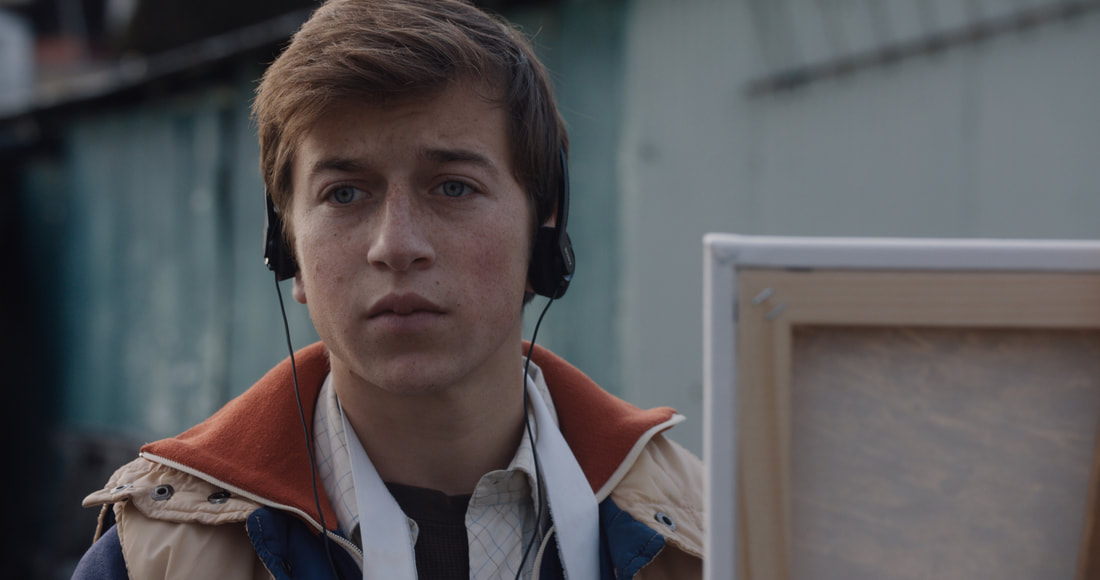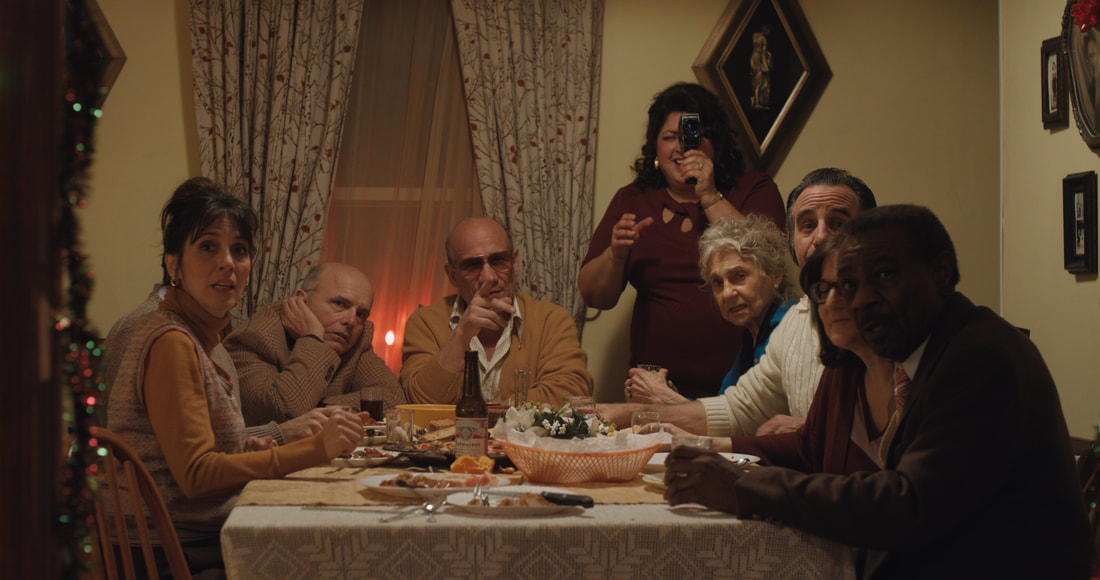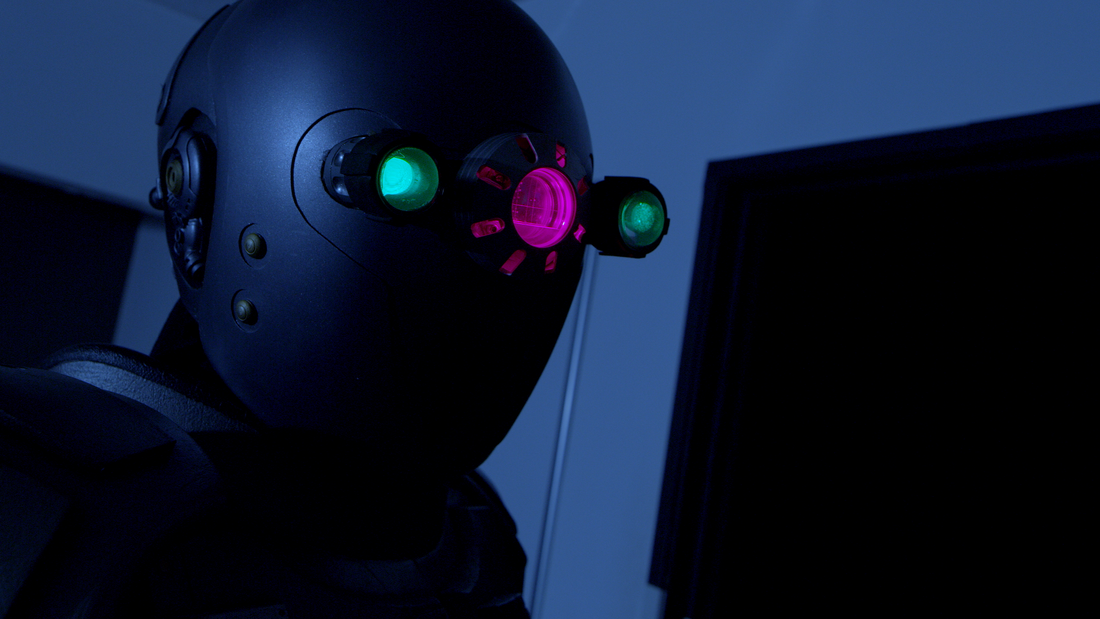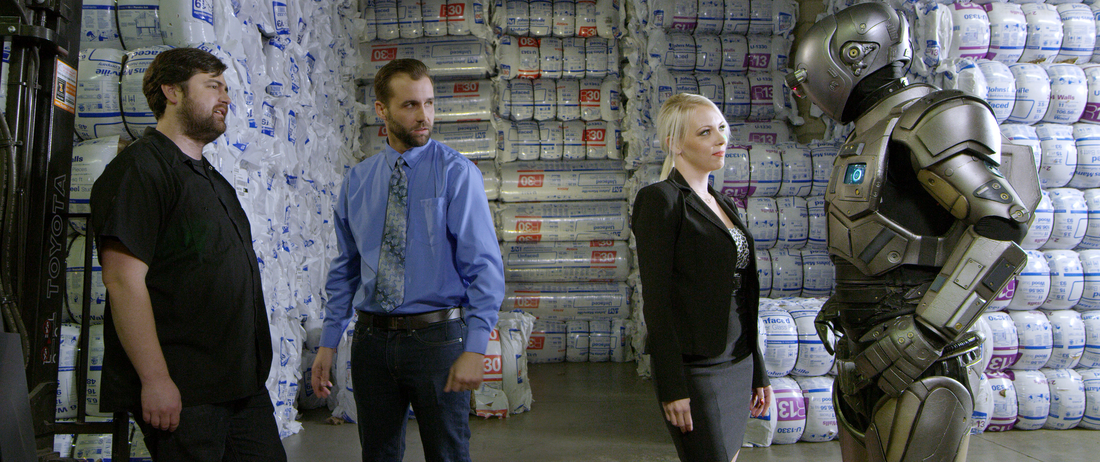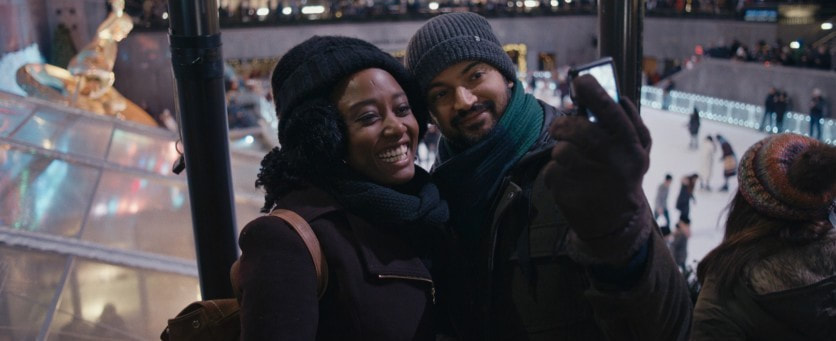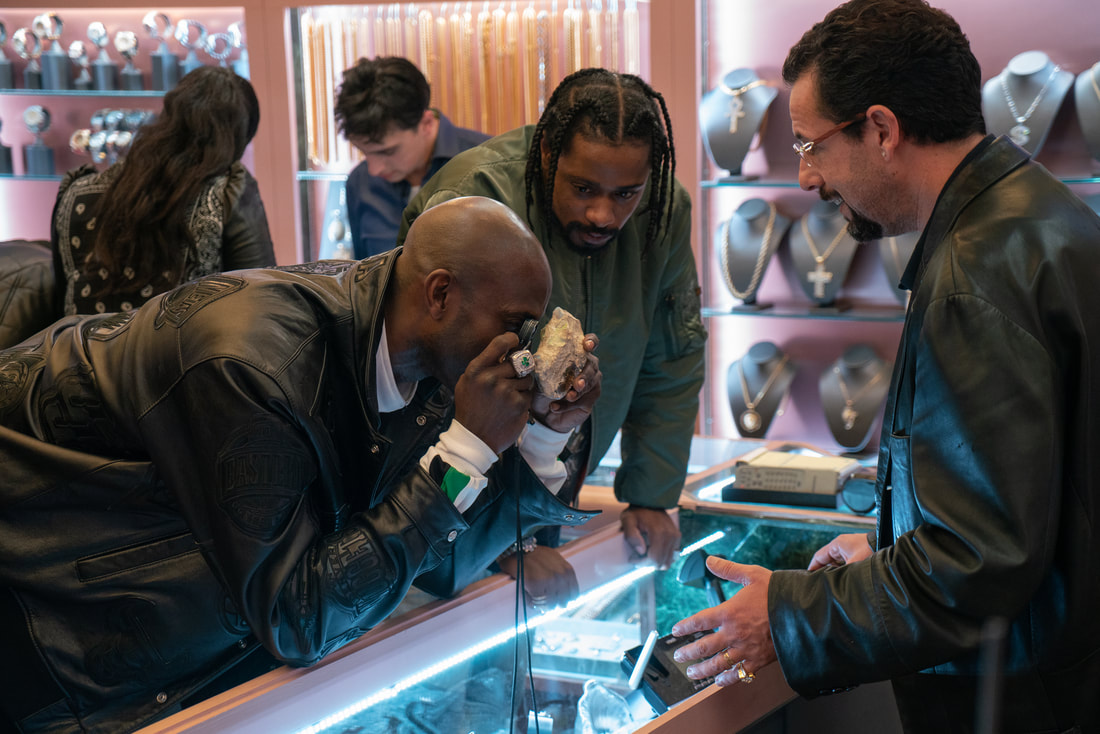WHITE SNAKE -- A Gorgeously-Animated but Narratively Inconsistent Exploration of Mythology12/28/2019 Review by Sean Boelman White Snake, directed by Jiakang Wang and Ji Zhao, is a new Chinese animated film rooted in one of the most well-known legends of Chinese folklore. Although the story could have used a bit more polish, the film’s roots in tradition and gorgeous animation make it worthy of a watch nonetheless. The film tells the story of a woman experiencing amnesia as she tries to rediscover her identity and her past with the help of a snake catcher. Perhaps the most interesting thing about this film is that the narrative is surprisingly complex for a film aimed at children. There are quite a few more moving parts in the story than is typical. However, even though this makes the film more involved than the usual children’s animated film, it also creates significant problems with pacing. Granted, the film has an undeniable energy about it, and that is what keeps the film entertaining, but it does become overwhelming at times. Younger audiences may have trouble keeping up with all of the different storylines and characters. Additionally, since the story is so chaotic, it is difficult to feel truly invested in the characters and their individual arcs. There are one or two characters whose stories are very compelling, but more often than not, viewers will be underwhelmed by the characters, and as a result, the film doesn’t resonate particularly well on an emotional level. The voice acting in the film is also relatively lackluster. As is the case with many foreign animated films, the voice actors are extremely over-the-top. With animated films, the actors do not have the benefit of facial expressions to convey emotion (that responsibility lies with the animators), so it is much harder for them to achieve subtlety. The cast fails at doing this.
That said, the film’s biggest strength is incorporating elements of Chinese mythology in an interesting way. While there isn’t a ton of depth to the film’s exploration of these ideas, the filmmakers introduce them in a way that will encourage younger viewers to take a deeper look into the foundations of the story. The animation from Light Chaser Animation is also very strong. The visual style of the film is very unique, each frame from the film feeling like a work of art in its own right. Even when the story isn’t as compelling as one would hope, the awe-inspiring look of the film is sure to keep viewers’ eyes locked on the screen completely. The script for White Snake could have used a bit more work, but its foundations in folklore are extremely compelling, and the animation is quite intriguing. It is certainly one of the year’s most unique animated films. White Snake is now playing in theaters. Rating: 3/5
0 Comments
S1E8: "Chapter 8: Redemption"Review by Sean Boelman Picking up after the massive cliffhanger at the end of Chapter Seven, the season finale of the Disney+ series The Mandalorian delivers a thrilling, if somewhat overwhelming conclusion to the saga of the Star Wars universe’s new favorite bounty hunter. Thanks to excellent direction from Taika Waititi, this episode lands firmly on the higher end of the series in terms of quality.
One of the defining characteristics of this series is that it allows the directors’ individual voices to shine through. Since a majority of the episodes (the last two excluded) are relatively self-contained adventures, there is a lot of room for each filmmaker to bring their own style to the table. In Waititi’s case, this allows the series’s final episode to be the most comedic one yet. While there have been plenty of humorous quips throughout the series, the first ten minutes of this episode serve as a welcome comedic relief to the constant anxiety that the previous episode caused. That said, there is still some very impressive action in this episode. With a longer runtime than any other episode of the show, there’s a lot happening here, and part of it is that Favreau is trying to set up the future of the series. Although there are some developments in this episode that may come as a shock to fans, the quality of this episode fully implies that Favreau and crew have plenty left to explore in this story, if only they keep up the spirit of creativity that it has inspired. The Mandalorian is now streaming on Disney+. Rating: 4.5/5 CHICHINETTE: THE ACCIDENTAL SPY -- A Compelling WWII Documentary with an Extraordinary Subject12/25/2019 Review by Sean Boelman Chichinette: The Accidental Spy, directed by Nicola Hens, is a new documentary film focusing on an unsung hero from WWII. Although it doesn’t quite take full advantage of its extraordinary subject and her stranger-than-fiction story, it is still a relatively entertaining and inspiring documentary. The movie tells the story of Marthe Cohn, a now ninety-eight-year-old Jewish woman who served as a spy during WWII and has gone on to become a prolific speaker talking about her own story. Although there have been plenty of stories about spies during the war, and also plenty of stories about the Jewish people fighting back against oppression, very seldom are these stories told from a female perspective. Pretty much everything about Cohn’s story is extremely inspiring, from fighting for what she believed in to teaching others about compassion. People of all ages can see her story and how she made a positive impact on the world in which she lived and be inspired to leave their own mark on the people around them. Perhaps the most interesting thing about Cohn is that, even at the age of ninety-eight, she continues to help people in her own way. As is the case with many films about WWII, the main moral of this story is to treat others with humanity. By looking back at the darkest hour and those people, like Cohn, who remained a source of light, society can learn how to deal with the other troubles they may face. As one would expect, Cohn is an extremely compelling protagonist. Although she doesn’t show a lot of growth over the course of the movie, she had already completed her emotional arc before the camera ever turned on her. All of the interviews with Cohn are absolutely captivating thanks to her magnetic personality that comes across very well on screen.
The most significant shortcoming of the film is that it is a bit unevenly paced. Even though the movie is less than an hour and a half long, it does start to feel a bit repetitive at times. Some of these derivative sequences could have been cut out and the film as a whole could have been even more captivating. On a technical level, the movie is quite strong. Hens tells Cohn’s story with a combination of archive images, interviews with Cohn, and footage from some of Cohn’s speeches about her experiences. While this combination of methods is pretty safe and typical, it is effective nonetheless because it conveys the story in a relatively concise and aesthetically-pleasing way. Chichinette: The Accidental Spy may be made in a relatively by-the-book way, but the story is by no means average. Because the film’s subject is so fascinating, this documentary ends up being quite satisfying. Chichinette: The Accidental Spy is now playing in theaters. Rating: 4/5 Review by Sean Boelman The fourth and final entry into the Donnie Yen-starring martial arts saga, Ip Man 4: The Finale concludes the story of the Kung Fu grandmaster who taught icon Bruce Lee. Although it isn't an entirely satisfying conclusion to the series, it is still another fun and stylish action flick with some great action sequences. The film follows Ip Man as he travels to the U.S. in the hopes of finding a school for his son to attend, only to find himself in the middle of a battle between the martial arts community and the unorthodox (and controversial) teaching style of Bruce Lee. Ultimately, this entry offers much of what fans have been waiting for from the series, as it contains the strongest connection yet to the protagonist’s (arguably) more famous protégé. However, perhaps the biggest issue with this movie is that there are way too many subplots. In addition to Ip Man’s main quest of making accommodations for his son after his passing and the prominent side quest of dealing with Bruce Lee’s impact on the martial arts community in the States, there are also subplots about a young girl being bullied and a military officer trying to prove that Kung Fu is an inferior martial art. Unfortunately, since there is so much going on, there is no way for all of them to feel fully-developed. Additionally, the film is very heavy-handed with the way in which it addresses its themes. A majority of the runtime is spent exploring the idea of inclusion, whether the American characters’ racism towards the Chinese characters or the Chinese Benevolent Association’s unwillingness to accept outsiders. From the beginning of the movie, it is clear that the filmmakers hope to promote inclusivity in all aspects of life. As a martial arts film, this delivers a handful of very good action sequences that are sure to be memorable. Granted, the focus isn’t as much on the action, the main purpose of the movie being to pay homage to the grandmaster by telling the events of the later part of his life. Still, the conflicts that do happen are choreographed and shot in a way that is thoroughly entertaining.
On a technical level, the film is definitely a bit messy, but the flaws in the movie help lend it a greater sense of visual energy. The kinetic cinematography is aggressive but still works quite well. The chaotic editing goes a long way in making the film feel more urgent even though the movie is rooted in its character arcs. These things help preserve the narrative momentum that is chopped up by the messy narrative. Donnie Yen is obviously very comfortable in his role as the eponymous martial artist, and as a result, he is endlessly fun to watch. Without a doubt, Yen’s performance is the best part of the film and likely the main draw that keeps viewers coming back to the series. The rest of the cast, particularly the American actors such as Scott Adkins, are over-the-top and ineffective. Ip Man 4: The Finale may not be the best finale that this series could have had, but it is entertaining nonetheless. It isn’t necessary to have the context of the other entries to watch this movie, but those who are uninitiated into the series probably won’t find much to love in this messy sequel. Ip Man 4: The Finale is now playing in theaters. Rating: 3/5 Review by Sean Boelman Taking its name from the Italian Christmas Eve tradition, Feast of the Seven Fishes is a new holiday romantic comedy sure to put viewers in the holiday spirit this season. Thanks to a witty script and great performances all-around from its talented ensemble, this is a charming and heartfelt indie comedy to add to the required holiday viewing list. The film tells the story of a large family preparing for their Christmas Eve celebration as they look back at their past and think about their future. Although this is a relatively simple set-up, there is something charming about the basic arc, hence why it is such a common one. Most people can relate to the hectic nature of the holiday season, and as a result, it is easy to feel endeared to these characters. However, unlike most Christmas movies, this movie is not overly reliant on a large ensemble. Even though the film focuses on a family getting together, there is a very clear protagonist and all of the rest of the characters function only to support his arc. A significant part of why this movie works so well is that the attachment that the viewer will form to the protagonist is so strong. As with any holiday-centric film, there is a very clear and direct message to be found in the script. That said, even though there isn’t much subtlety regarding what the movie has to say about love, writer-director Robert Tinnell handles it in a way such that the themes don’t feel overly saccharine, unlike many other romances set during the season. Tinnell also paces his film in a way that is very enjoyable to watch. Since all of the actors in the ensemble have such great chemistry together, the lines have a natural bounciness to them that lends a tremendous narrative momentum to the movie. While the film is never outright hilarious, it is consistently funny.
It is great to see Skyler Gisondo (Booksmart) get a lead role after having been the funniest part of many of the movies in which he has acted in the past. This film also gives him room to prove his dramatic chops, as there are plenty of strong emotionally-driven moments to be found in the script as well. The supporting cast of the movie, especially Madison Iseman and Joe Pantoliano, are very good, but Gisondo frequently maintains the spotlight. On a technical level, the film is pretty strong, as Tinnell does a very good job of setting the atmosphere of the movie. The film is set in the early 1980’s, and as such, much of the movie feels very retro. This old-school energy that radiates throughout the film is frequently infectious, fueling it with the nostalgia that any generation will feel for their own childhood holiday experiences. As the holiday surprise of the year, Feast of the Seven Fishes is a charming little indie comedy full of the Christmas spirit. Hopefully this movie will catch on with those who see it this year and gain word-of-mouth to make its way into the rotation of essential Christmas films. Feast of the Seven Fishes is now available on VOD. Rating: 4/5 Review by Sean Boelman Automation, co-written and directed by Garo Setian, is a new sci-fi film that also attempts to tie in multiple other genres. Although it is admittedly all-over-the-place, that is a majority of the movie’s charm, as this seems destined to become a cult classic on the so-bad-it’s-hilarious circuit. The film follows a robot working at a shipping company who starts to kill off his human co-workers after learning that he will be deactivated in favor of a newer model. The satire in this premise is evident (the title should be a dead giveaway about the movie’s main theme), but Setian and the other writers are able to do enough with the script to keep it intriguing. As is obvious, the film is a commentary on modern corporate practices, and much of what Setian et al. have to say represents common concerns of working-class Americans today. Still, because of how heavy-handed the movie is (it’s literally a horror movie about worker automation gone wrong), this message may not connect with everyone as expected. If the film does nail one thing, it is the moral ambiguity of the robot character. While he is not truly the protagonist, he is undeniably the most compelling and well-developed character in the movie. His internal struggle serves as the only real emotional arc, and ultimately, he experiences the most change. It’s a shame that the filmmakers felt the need to impose a human protagonist. Perhaps the most off-putting thing about the film is that it is tonally inconsistent. Although the movie is clearly sci-fi, there are multiple other genres into which this film could also fall. There are some comedic moments (though whether or not these were purposeful could be up for debate), some suspenseful horror-driven moments, and some scenes in which it seems like the movie is going to turn into a romance.
Across the board, the acting in the film is very weak, but this ties into the so-bad-it’s-funny feeling that the movie encapsulates. Granted, not all of the blame can be placed on the cast — the script has a large part in the film’s overwhelming cheesiness — but the lack of charm and the overly flat delivery is entirely their own responsibility. On a technical level, the movie is also very lackluster, but not much more could be expected from a B-movie such as this. The practical effects for the film are outright laughable, and the cinematography is frequently bad. The movie overuses the gimmick of simulated screens (to mimic the robot’s perspective), and they are entirely unconvincing. Automation has some very entertaining moments in a ridiculous way, but it is by no means a good film. Even though there are some interesting ideas, the filmmakers try to juggle too many tones and the result is a comedic mess. Automation is now available on VOD. Rating: 2.5/5 Review by Sean Boelman A New Christmas, directed by Daniel Tenenbaum, is a new holiday dramedy set in the city of New York. Yet even though the film has some very good intentions, it ultimately leans into the sentimentality of the story far too heavily for it to be particularly memorable against the flood of Christmas movies that are available. The movie follows a man who is grieving the loss of his mother, causing a rift to form in his marriage, as he meets a charming stranger, sending him on a quest to re-learn the meaning of Christmas. The film follows a very common arc — that of a grumpy holiday hater getting a dose of Christmas spirit — and adheres to it, pretty much to the beat. As such, the movie doesn’t feel remotely original or inspired. Still, despite the overwhelmingly generic nature of the film, it is difficult to get bored with it, as the pacing is so aggressive. Clocking in at just under an hour and twenty minutes, the entire movie feels extremely rushed. Just as soon as the story starts to become truly compelling, it is over, and one can’t help but feel like the filmmakers should have taken their time and let things simmer a bit more. The film is also very underwhelming in terms of its character development. Even though the protagonist has a solid backstory, there simply isn’t enough time to make the audience truly feel connected to the character. And as for his foil, the perky stranger, she feels completely flat. Her desires and aspirations are completely irrelevant to the greater story (or at least the filmmakers seem to believe that), so they are not included at all. Emotionally, the movie seems like it should be a slam dunk given the fact that the film is largely centered around coping with grief, but all of the emotions feel artificial and unearned. Again, this boils down to the fact that the audience doesn’t really have a true connection with the characters, meaning that these tear-jerking moments are just that.
It is in the acting that the movie really shows its low budget. The leads don’t have good chemistry at all, and that makes one wonder whether or not the filmmakers had the time and resources to screen test them together, or if they simply cast them and hoped for the best. Both of them have their own charming moments, but they don’t work together as a pair. The film also feels relatively cheap on a technical level. It really is a shame that the movie isn’t more effective visually, because it has the advantage of being set in New York City, a very common setting for holiday-themed films. Still, despite the large amount of holiday cheer happening in the background, the movie is missing that spirit. A New Christmas was obviously made with the best of intentions, but it is too by-the-book to be worth passing up on another holiday flick. If this had been released on television, it may have felt more in its place, but as a traditional release, it’s underwhelming. A New Christmas is now available on VOD. Rating: 2/5 Review by Sean Boelman Although it may sound like a new Christmas film, A Reindeer’s Journey is instead a new nature documentary about the non-magical version of the eponymous animal. However, despite some breathtaking imagery, the filmmakers aren’t able to pull a compelling enough narrative out of the footage. The movie follows a young reindeer as he grows up in the Lapland of Finland. Although it isn’t uncommon for documentarians to impose a coming-of-age storyline on nature documentaries like this, filmmaker Guillaume Maidatchevsky imposes one that is so standard and by-the-book that the gorgeous footage feels entirely wasted. Even though the film clocks in at less than an hour and a half, it ultimately feels much longer because the movie is so poorly-paced. Much of the film is far too slow-moving for its own good. It is obvious that there had to be some more exciting footage, or at least a way to present the footage in a more narratively interesting way. That said, the movie does a solid job of making the audience care about the main reindeer, Ailo, if only because most audiences will find themselves enamored with the cute animal. Yet unfortunately, there is little more to the film than that. The personified character which the filmmaker builds for Ailo is just as generic as the story being presented. Like many other nature documentaries as of late, the movie is a bit misleading in that it is not focused exclusively on the animal in its title. Instead, the focus is on the entire ecosystem of the Lapland. Too much time is spent on the other animals featured in the footage, attempting to force an arc onto them in addition to Ailo, leaving the main storyline of the film feeling underwhelming.
The movie’s narration, from Donald Sutherland in the U.S. version, is also extremely bland. Even though Sutherland’s talents as a performer are indisputable, it seems that his voice does not make for a good nature documentary narration. Whereas a comedically-oriented actor could have saved the film from being outright boring, Sutherland’s straightforward voiceover could almost lull one to sleep. Regardless, the movie does offer what is the main draw of nature documentaries: some absolutely beautiful footage of the wilderness. Maidatchevsky undeniably has a very good eye, and the cinematographers are certainly very talented, but it is just a shame that their visual talents are squandered on such a mediocre narrative. A Reindeer’s Journey is a disappointing nature documentary even though it does feature quite a few breathtaking shots. Sadly, it almost feels as if the film would be better if the audio were turned off completely. A Reindeer’s Journey is now available on VOD. Rating: 2/5 Review by Dan Skip Allen In a world devoid of love, compassion and caring, the Holy Seat is a place that shares its love of God and Jesus. Without a world that embraces them, they are lost. When Pope John Paul II passed away that they had to replace him with another, Cardinal Ratzinger (Anthony Hopkins). He inherits a pulpit in turmoil. The world as a whole doesn't believe in the church anymore. When a scandal is detected within his cabinet this makes matters worse for him, causing him to request the audience of Cardinal Jorge Bergoglio (Jonathan Pryce), his harshest critic, to come visit him in Rome. Here these two men would try to build a bridge to form a better understanding of each other and the world as a whole. Flashbacks will help the viewer to a better understanding of Bergoglio's past and why he believes what he does. He is a complicated man at best. His past helps him to understand Ratzinger and his pain that much more. They are involved in a conversation that will help forge a new beginning for the church and its billion followers. This film is based on real events, so stock footage of news broadcasts help to fill in the gaps of the story. They are very effective in that regard. The pulse of the world around the pulpit can be an eye opening experience for the man sitting in the chair of St. Peter, and Ratzinger is affected in this way. Fernando Mierelles seemed to be granted full access of the Vatican for the film. They walked various halls and locations within the Vatican which provided visual ecstasy during their walks, helping with the authenticity of the film and its characters. The settings, including Ratzinger's summer house, were all beautiful to behold. All of these lavish things Popes get thrust upon them aren't exactly what they signed up for when they became priests years before. They just have to be seen to be a king among men of a following of a billion. They have to look the part. Mierelles creates that world these men live in perfectly to an extent that anyone would be envious of it. Finding two men to portray the leads in this film couldn't have been an easy task for Mierelles. Even though the two actors are distinctively different from one another, they had to interact quite a bit throughout the film. They needed to have a good chemistry with one another, and Hopkins and Pryce have just that. They play a cat and mouse gave with words, bickering and bantering with each other. This is worth the price of admission alone. These two great actors go back and forth, each gaining and losing ground within this philosophical conversation about the church and its people.
The Two Popes is an entertaining film that asks a lot of questions and answers some of them. This fantastic two-hander gives viewers a reason to rethink their position on religion, the church, and the man at the top. Netflix has made strategic decision to go away from old and established IP's for new and original films and series. This strategy has worked to perfection. Films like The Irishman, Marriage Story, and The Two Popes have given audiences new and distinctive visions from groundbreaking filmmakers. The Two Popes is a vision only Mierelles could create and he does a great job with it. The Two Popes is now streaming on Netflix. Rating: 4/5 Review by Sean Boelman After their 2017 film Good Time gained an almost instant cult following, audiences have been waiting for the follow-up of writer-directors Josh and Benny Safdie, Uncut Gems. This highly stylized effort doesn’t have the same level of polish, but it is nonetheless an intense and well-acted thriller. Both of the Safdies’ recent movies are characterized by their grim tone addressing some of the darkest aspects of humanity. To call their films bleak would be an understatement, as both movies’ protagonists are extremely flawed and collapse under the pressure placed upon them by society. In this way, the audience ends up having an almost love-hate relationship with the characters, because even though they seemingly keep making the wrong decisions, there is a human quality to them that endears them to the viewer. That said, despite the sometimes overwhelming dreary nature of the films’ plots, both Good Time and Uncut Gems approach their stories with a sense of dark humor. This is particularly the case with Uncut Gems, as the movie was designed to lean into star Adam Sandler’s comedic sensibilities, but the kind of nervous laughter that results from the film making the viewer uncomfortable is common in both. Likely the clearest link between the two movies is the thematic thread that ties them together. Both Good Time and Uncut Gems deal with the issues of addiction and masculinity. In their films, the Safdies explore the character’s addiction to success. Whereas Uncut Gems more explicitly features a character trying to win, Good Time is more subtle in this regard as Robert Pattinson’s character tries to beat the odds that are stacked against him. Perhaps the most effective part of the Safdies’ movies is the extreme amount of anxiety that they cause. Good Time starts at a ten and stays there for the entirety of its hour-and-forty-minute runtime, but Uncut Gems builds that tension more slowly over its two-plus hours. Both films are mostly effective, though Uncut Gems only truly finds its footing in the last forty-five minutes, which are riveting. The Safdies also use their sound design in a very deliberate way, but this also comes at the expense of other aspects of the movie. In Uncut Gems, the sound mixing is a bit too aggressive, as the score frequently becomes overpowering. While this does heighten the sense of unease felt by the viewer, it also makes the dialogue difficult to hear at times.
That said, the blaring music in the film is very complex and does an excellent job of setting the tone. Daniel Lopatin (also known as Oneohtrix Point Never) provides the score for both movies, and the synth-heavy sounds work quite well. Uncut Gems is unique in the fact that diegetic music also plays a huge role in the film, as The Weeknd has a cameo as himself in part of the movie. Additionally, both of the Safdies’ films have proven to be powerful starring vehicles for their leading actors. Good Time was written with Pattinson in mind, and Sandler was the filmmakers’ first choice to play the lead in Uncut Gems. Both performances were among the best of their respective years due to a combination of the roles being custom-tailored for their performer and the Safdies’ ability to get an excellent performance out of the lead. Also interesting is the Safdies’ use of the supporting cast. Although both movies are very much focused on the lead actor, they also feature some interesting turns from other players. Good Time features a fascinating albeit flawed performance from filmmaker Benny Safdie himself, and one of the most compelling aspects of Uncut Gems is a performance from basketball player Kevin Garnett as himself. Even though Uncut Gems is certainly messier than Good Time, it still features many of the aspects that fans of their last film would have identified. The Safdies haven’t quite earned the title of the modern auteur yet, but their next outing may prove them to be deserving. Uncut Gems is now playing in theaters. Rating: 3/5 |
Archives
July 2024
Authors
All
|
|
|
disappointment media
Dedicated to unique and diverse perspectives on cinema! |




